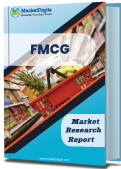
Food Authenticity Market By Food Tested (Meat & Meat Products, Dairy & Dairy Products, Cereals, Grains, and Pulses, Processed Food and Others),Target Testing, (Meat Speciation, Country of Origin and Ageing, Adulteration Tests, and False Labelling), Technology (PCR (Polymerase Chain Reaction)-Based, Liquid Chromatography- Mass Spectrometry, Isotope Method, Immunoassay-Based/Elisa (Enzyme-Linked Immunosorbent Assay) and Others) - Partner & Customer Ecosystem (Product Services, Proposition & Key Features) Competitive Index & Regional Footprints by MarketDigits - Forecast 2024 – 2032
Industry : FMCG | Pages : 173 Pages | Upcoming : Jun 2024
The global food authenticity market reached a value of $5.3 billion in 2017 and is projected to reach $10.0 billion by 2030, growing at a CAGR of 6.9% from 2023 to 2030. Food authenticity involves laboratory testing to validate the composition and quality of food products. Various food and beverage items such as fruit juice, edible oil, beer, and wine can undergo advanced instrumental testing to ensure their purity. It is also utilized to verify the accuracy of label claims on food products.
The market is driven by the implementation of stringent regulations worldwide to combat food fraud, an increase in economically motivated adulterations (EMA) due to intense competition among food producers, and a rise in instances of food debasement, including adulterations, false labeling, and certification issues. Additionally, the rapid growth of international trade and the growing consumer awareness regarding food authenticity and certification are expected to fuel market expansion. However, challenges such as a lack of food control infrastructure in developing economies, complex testing techniques, and regulatory harmonization issues may impede market growth in the near future. On the other hand, technological advancements such as onsite testing kits and the emerging markets in Asia-Pacific, South Africa, and other regions present promising opportunities for market growth.
Asia-Pacific is experiencing significant growth in the food authenticity market compared to other regions. The region's improving economic conditions and increasing disposable income are key drivers for market expansion. Additionally, the LAMEA region has witnessed economic growth, leading to more companies adopting food testing methods and contributing to overall market growth. Consequently, there are untapped regions in Asia-Pacific and LAMEA that hold substantial growth prospects in the coming years.
The market is categorized into different segments based on target testing, technology, and food tested. Target testing includes Meat Speciation, Country of Origin and Ageing, Adulteration Tests, and False Labelling. Adulteration tests are the most widely used type of food authenticity testing, while meat speciation testing is expected to experience the highest growth.
In terms of technology, the market is divided into PCR (Polymerase Chain Reaction)-Based, Liquid Chromatography-Mass Spectrometry, Isotope Method, Immunoassay-Based/ELISA (Enzyme-Linked Immunosorbent Assay), and Others. PCR technology is the most commonly used in the food authenticity market.
The market is further segmented by the type of food tested, including Meat & Meat Products, Dairy & Dairy Products, Cereals, Grains, and Pulses, Processed Food, and Others. Processed food is the dominant segment, but meat & meat products are gaining popularity and expected to have the highest growth.
The report focuses on analyzing the growth prospects, restraints, and opportunities in the global food authenticity market. It includes Porter's five forces analysis to understand the impact of factors such as competitive intensity, supplier bargaining power, threat of substitutes, threat of new entrants, and buyer bargaining power in the market.
Major players analyzed in the report include SGS S.A., Intertek Group Plc., Eurofins Scientific SE, ALS Limited, LGC Science Group Ltd., Mérieux Nutrisciences Corporation, Microbac Laboratories, Inc., EMSL Analytical Inc., Romer Labs Diagnostic GmbH, and Genetic ID NA, Inc.
Covid-19 Impact Analysis
The food authenticity industry was negatively impacted by the pandemic due to government restrictions and regulations, which affected the authorities' ability to efficiently check food authenticity. Testing laboratories faced constraints in following social distancing guidelines and experienced reduced availability of materials and staff.
However, the industry is expected to experience increased sales in the post-Covid scenario due to the persistent consumer focus on health and wellbeing caused by the pandemic.
Key Benefits for Stakeholders
The report provides an extensive analysis of current and emerging trends and opportunities in the food authenticity market. It offers qualitative and quantitative analysis of the current trends and future estimations, helping evaluate the market opportunities. The report includes forecasts, information on key drivers, restraints, and opportunities. It also analyzes key product positioning and monitors top competitors within the market framework. Additionally, the report provides qualitative insights on potential and niche segments or regions exhibiting favorable growth.
Food Authenticity Market Report Highlights
By TARGET TESTING
• Meat Speciation
• Country of Origin and Aging
• Adulteration Test
• False Labelling
By TECHNOLOGY
• PCR (Polymerase Chain Reaction) Based
• Liquid Chromatography-Mass Spectrometry
• Isotope Method
• Immunoassay-Based/Elisa (Enzyme-Linked Immunosorbent Assay)
• Others
By FOOD TESTED
• Meat & Meat Product
• Dairy & Dairy Product
• Cereal, Grain, and Pulse
• Processed Food
• Others
By GEOGRAPHY
• North America
o U.S
o Canada
o Mexico
• Europe
o UK
o Germany
o France
o Italy
o Spain
o Rest of Europe
• Asia-Pacific
o China
o India
o Japan
o South Korea
o Rest of Asia-Pacific
• LAMEA
o Brazil
o Turkey
o South Africa
o Rest of LAMEA
TOC
Table and Figures
Methodology:
At MarketDigits, we take immense pride in our 360° Research Methodology, which serves as the cornerstone of our research process. It represents a rigorous and comprehensive approach that goes beyond traditional methods to provide a holistic understanding of industry dynamics.
This methodology is built upon the integration of all seven research methodologies developed by MarketDigits, a renowned global research and consulting firm. By leveraging the collective strength of these methodologies, we are able to deliver a 360° view of the challenges, trends, and issues impacting your industry.
The first step of our 360° Research Methodology™ involves conducting extensive primary research, which involves gathering first-hand information through interviews, surveys, and interactions with industry experts, key stakeholders, and market participants. This approach enables us to gather valuable insights and perspectives directly from the source.
Secondary research is another crucial component of our methodology. It involves a deep dive into various data sources, including industry reports, market databases, scholarly articles, and regulatory documents. This helps us gather a wide range of information, validate findings, and provide a comprehensive understanding of the industry landscape.
Furthermore, our methodology incorporates technology-based research techniques, such as data mining, text analytics, and predictive modelling, to uncover hidden patterns, correlations, and trends within the data. This data-driven approach enhances the accuracy and reliability of our analysis, enabling us to make informed and actionable recommendations.
In addition, our analysts bring their industry expertise and domain knowledge to bear on the research process. Their deep understanding of market dynamics, emerging trends, and future prospects allows for insightful interpretation of the data and identification of strategic opportunities.
To ensure the highest level of quality and reliability, our research process undergoes rigorous validation and verification. This includes cross-referencing and triangulation of data from multiple sources, as well as peer reviews and expert consultations.
The result of our 360° Research Methodology is a comprehensive and robust research report that empowers you to make well-informed business decisions. It provides a panoramic view of the industry landscape, helping you navigate challenges, seize opportunities, and stay ahead of the competition.
In summary, our 360° Research Methodology is designed to provide you with a deep understanding of your industry by integrating various research techniques, industry expertise, and data-driven analysis. It ensures that every business decision you make is based on a well-triangulated and comprehensive research experience.
• Product Planning Strategy
• New Product Stratergy
• Expanded Research Scope
• Comprehensive Research
• Strategic Consulting
• Provocative and pragmatic
• Accelerate Revenue & Growth
• Evaluate the competitive landscape
• Optimize your partner network
• Analyzing industries
• Mapping trends
• Strategizing growth
• Implementing plans
Covered Key Topics
Growth Opportunities
Market Growth Drivers
Leading Market Players
Company Market Share
Market Size and Growth Rate
Market Trend and Technological
Research Assistance
We will be happy to help you find what you need. Please call us or write to us:
+1 510-730-3200 (USA Number)
Email: sales@marketdigits.com







